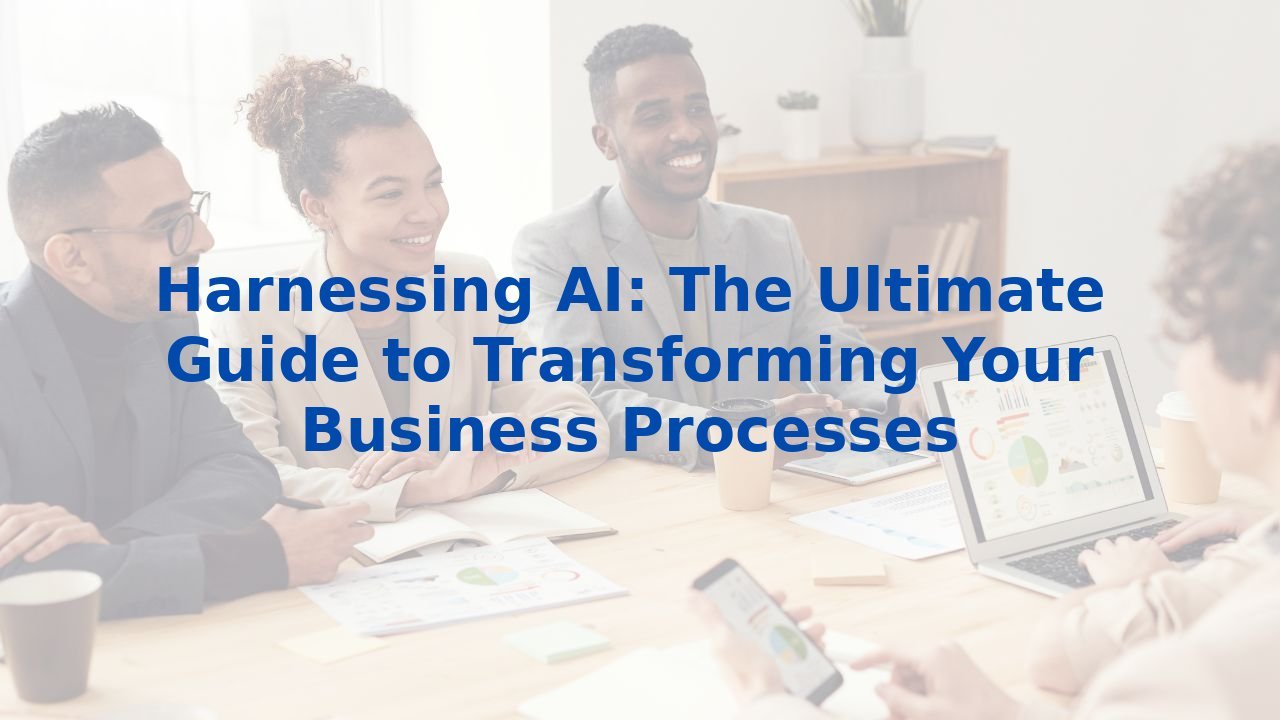Harnessing AI: The Ultimate Guide to Transforming Your Business Processes
Harnessing AI: The Ultimate Guide to Transforming Your Business Processes
In the ever-evolving landscape of business, where adaptability is pivotal, the potential of Artificial Intelligence (AI) stands out. It's not merely a trend; rather, it's a powerful catalyst for transforming business processes. By integrating AI into your operations, you're not just keeping pace with change but positioning your organization to thrive in a digital-first world. Let’s explore how AI enhances various business processes and the vast benefits it brings to organizational efficiency.
Data Analysis and Insights
At the core of AI capability lies its proficiency in data analysis. Businesses today generate staggering amounts of data, often too much for traditional methods to handle. Here, AI emerges as a beacon of efficiency. By swiftly analyzing this data, AI identifies trends, predicts outcomes, and highlights root causes of inefficiencies. This expedited analysis empowers organizations to make informed decisions that steer them toward tactical and strategic success.
Process Building and Automation
Imagine simplifying your workflows while simultaneously enhancing their effectiveness. AI makes this dream a reality. Through its ability to analyze parameters and user requirements, AI streamlines the building of processes and workflows. Manual tasks such as data entry and customer inquiries, which often bog down operations, can be automated. This not only liberates your talented workforce but allows them to focus on higher-value tasks that drive your business forward.
Process Discovery and Mapping
Understanding inefficiencies within existing processes is paramount for continuous improvement. AI-driven process discovery leverages techniques such as process mining and natural language processing to unveil hidden bottlenecks. By translating these insights into actionable blueprints, organizations can maintain current and accurate process documentation. The outcome is a refined operational model that addresses inefficiencies effectively.
HR and Recruitment
The transformational impact of AI isn’t confined to operations—it extends into Human Resources as well. Traditional recruitment processes can be time-consuming, often leading to biases. AI intervenes by enhancing objectivity in candidate selection. It efficiently manages assessments, filtering through a high volume of applicants while enhancing accuracy in recruitment decisions. This efficiency not only saves time but also refines the quality of your hires, fostering a robust organizational culture.
Sales and Marketing
Sales and marketing processes, critical to growth, can be significantly optimized with AI tools. Through predictive analytics, AI helps sales teams focus on high-value prospects by identifying customers most likely to convert. Furthermore, using chatbots in marketing strategies enhances customer interaction, turning inquiries into meaningful engagement. The end result? A tighter sales funnel and an improved customer experience that fuels revenue growth.
Customer Service Optimization
In today's world, exceptional customer service is non-negotiable. AI enhances this aspect by automating responses for basic inquiries, effectively addressing customer needs. Real-time feedback analysis powered by AI enables customer service teams to identify recurring issues, allowing for swift resolution. This not only enhances customer satisfaction but also solidifies loyalty—a priceless asset in business.
Product Development Enhancement
Innovation is at the heart of product development. AI augments the creative process through generative design, allowing designers to input specific goals and generate multiple viable designs. This streamlining process not only conserves resources but reduces time spent on prototypes that may not meet market needs. By integrating AI, companies stand to welcome a new era of inventive solutions and products.
Benefits of AI for Improving Efficiency
- Enhanced Productivity: Repetitive tasks handled by AI free up valuable human resources for more strategic contributions.
- Improved Decision Making: Data-driven insights facilitate informed choices, ensuring companies are always a step ahead.
- Reduced Errors: Automation minimizes human error, leading to more reliable and efficient processes.
- Real-Time Monitoring: AI’s capability to monitor operations constantly identifies issues before they escalate, allowing for proactive management.
The Importance of Training Employees for AI
While AI technology is transformative, its efficacy hinges on the skills of the workforce engaging with it. Comprehensive training is essential—not just in understanding AI's capabilities but in adapting to its integration. As your organization evolves, fostering an environment that prioritizes learning enables employees to complement AI's capabilities with critical skills, enhancing overall productivity.
Your journey to harnessing AI doesn't have to be overwhelming. Begin by embracing the idea that this technology, when combined with a properly trained workforce, can elevate your organization to new heights. Investing in training not only facilitates smoother transitions but empowers your team to drive strategic initiatives with confidence.
Conclusion
Integrating AI into business process management is a leap toward a future defined by efficiency and effectiveness. From data analysis to product development, the touchpoints of AI's impact are vast. However, the journey doesn't end here; it begins with your commitment to training and developing your workforce. By harnessing AI's potential while investing in your people, your organization is poised for sustained success in an increasingly competitive landscape.



